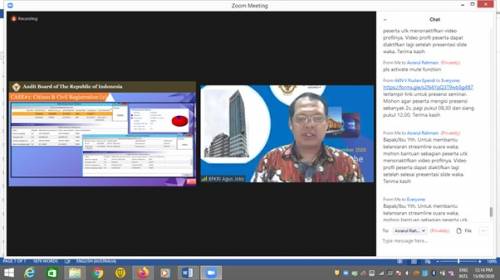BPK Holds a Seminar with RMIT University Australia
JAKARTA, BPK Public Relations - The Audit Board of the Republic of Indonesia (BPK) in collaboration with the Royal Melbourne Institute of Technology (RMIT) University Australia held a virtual international seminar themed "Integrated Audit and the Role of Big Data in Performance Audit" on Tuesday. It presented BPK Vice Chairman Agus Joko Pramono, Board Member V Bahrullah Akbar, Expert of Performance Auditing and Fellow of the Australian Evaluation Society of the RMIT University Scott Bayley. The seminar was moderated by Project Manager of RMIT University Mal Tennekoon and attended by 94 participants from BPK Representative and Head Offices.

Board Member V said in his speech that to provide added value for stakeholders and other users of the audit reports, it is necessary for the BPK to develop a financial audit integrating certain performance aspects achieved by the government in a certain period, which is so called as a Long Form Audit Report (LFAR). It is in line with the International Standards of Supreme Audit Institutions (ISSAI) 12 aiming at encouraging the government to not only pursue the predicate of the unqualified opinion, but also to manage as much existing resources as possible to support the national development for people's welfare.
"We hope this approach can help the government achieve national objectives as stipulated in the Preamble to the 1945 Constitution. It is also in line with the BPK Strategic Plan that encourages the state financial management to achieve national objectives through quality and useful audits," he said.
The BPK had formulated the LFAR guidelines based on existing provisions and best practices. The task force had then prepared the pilot project that included planning, implementation and reporting stages. In the first semester of 2020, there were five BPK Representative Offices in Aceh, Lampung, Banten, DKI Jakarta and East Java that had completed the LFAR pilot project applied on local government financial report Fiscal Year 2019. The pilot project was implemented based on efficient allocation of auditors assessing the achievement of local government programs in the fields of public services, infrastructure and management of special autonomy funds.
Scott Bayley in his presentation explained the strategy of conducting a performance audit in the condition of limited time and resources. The audit institution had to carry out environmental scans throughout the year to identify potential topics for a performance audit. Each year, the audit institution received a lot of questions, statements of concern and requests for special investigations from both Members of Parliament and the public, especially on actions taken by public sector bodies or the management of public resources.
"In Australia, our audits are conducted in an objective and ethical manner, in strict confidentiality and in accordance with the requirements of our auditing practice. Most importantly, all information received from special requests, expressions of concern and disclosure of public interest, is used to assist us in identifying upcoming audit topics. To maintain the independence of auditors, we have systems in place to ensure that the decisions taken in the audit are made with the proper consideration of the merits of an audit," he said.

In his presentation themed "the Role of Big Data in Government Audit”, BPK Vice Chairman explained the use of Big Data in auditing. An example presented was the performance audit conducted on the civil registration administration, aiming at assessing the effectiveness and analyzing the use of data with regard to data quality, accuracy and reliability. Another use of Big Data is reflected such as in the conduct of the special-purposed audit on the e-catalog of the government procurement of goods and services. The audit assesses the compliance in using the e-catalog system, of which the data could be used to evaluate government procurement policies and their implementation in the agreements with e-commerce providers.
In addition, the use of Big Data was also found in the audit on the government performance in handling the Covid-19 pandemic that is currently underway. The audit aimed at assessing effectiveness, transparency, accountability and compliance of the Covid-19 pandemic handling.
